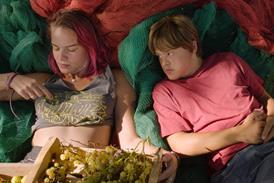Theodore Pellin won the Critics’ Week Rising Star Award for his ‘soulful’ performance in Pauline Loques’ debut feature

Dir/scr: Pauline Loques. France. 2025. 97mins
A bombshell medical diagnosis prompts a young man to reflect on life’s precious gifts in Nino, Pauline Loques’ delicately-handled debut feature which builds into a touching drama carried on a soulful, understated central performance from Theodore Pellerin. This, together with Pellerin’s Cannes Critics Week Rising Star Award, could tip the balance towards a modest arthouse future.
Loque puts her own imprint on a universal story
On a roll after recent performances in mini-series Franklin (2024) and Sundance success Lurker (2025), Pellerin is well-cast as Nino Clavel, an introverted, diffident figure in his late 20s. A seemingly routine medical appointment leaves him with the news that he has throat cancer caused by human papillomavirus (HPV). Deemed a priority because of his age, his chemotherapy will begin in three days. The treatment means he will no longer be able to father children but he is left with the scant consolation that at least he will not lose his hair. There are no emotional fireworks in response as Nino quietly absorbs the news. “What are my chances of dying?,” he meekly asks. “Let’s talk chances of survival,” comes the response.
Based in part on Loques’ own loss of a loved one to cancer, (the film is dedicated to ‘Romain’), Nino follows the titular character over the weekend of his 29th birthday. The loss of the keys to his apartment forces him to spend the weekend on the move, drifting through an unfamiliar Paris as he goes to visit his mother (Jeanne Balibar), attends a surprise birthday party organised by his friend Sofian (William Lebghil) and bumps into old schoolmate Zoe (Salome Dewaels) and her son Solal (Balthazar Billaud). He seems to be seeking something to hold onto as everyday life carries on regardless.
Nino carries his cancer diagnosis alone, as if the very act of sharing his news would make it feel all the more real. He walks the streets, cycles and seems to embrace his isolation. There is a sense in Pellerin’s performance that Nino has always been a placid figure, eternally alone in a crowd. Friends always seem to be encouraging him to become more motivated.
Loques’ tender debut feels connected to a tradition of French cinema that includes Agnes Varda’s Cleo From 5 to 7 (1963), in which a young singer awaits test results, and Francois Ozon’s Time To Leave (2005) in which a young photographer faces terminal cancer. Loques also tips her hat to the cinema of Claude Sautet with her touching use of a photograph of Romy Schneider from his The Things Of Life (1969).
Loque puts her own imprint on a universal story, revealing a light touch as she subtly weaves matters of life and death into the film. Nino has a hunger for details of his father’s death at the age of 44; his friend’s sister is planning ahead for motherhood; and he revels in the chance to feel like a father to the young Solal as they play together and he devises a bedtime story for him.
Nino is not a film that tugs at the heartstrings. It is quietly observant, encouraging a feeling of intimacy through extensive use of close-ups and the comforting anonymity to be found in a big city. Exposing Nino to friends, family and the wisdom of strangers (including a brief cameo from Mathieu Almaric) gently leads him down a path towards choosing life. Pellerin successfully inhabits Nino’s diffidence and reserve, but his modest smiles and fond looks effectively convey how the character gradually warms up. The climactic use of the Fontaines D.C. track In ’The Modern World’ provides a perfect expression of how the shadow of death has allowed Nino to reconnect with life.
Production company: Blue Monday Productions
International sales: The Party Film Sales. sales@thepartysales.com
Producer: Sandra da Fonseca
Cinematography: Lucie Baudinaud
Production design: Aurette Leroy
Editing: Clemence Diard
Main cast: Theodore Pellerin, William Lebghil, Salome Dewaels, Jeanne Balibar























